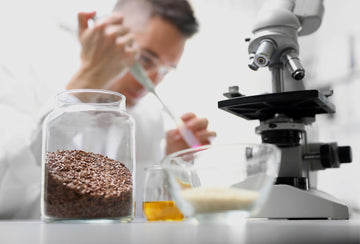Amino acids – why the “building blocks of life” are so important for you
You may have heard that amino acids are the "building blocks of life." Sounds impressive—but what exactly does that mean? Why does your body need amino acids? And how can you ensure you're always getting enough?
In this blog, you will learn about the functions of amino acids, what happens when there is a deficiency, and when it makes sense to supplement them.
What are amino acids anyway?
Amino acids are tiny organic molecules—yet they are among the most important building blocks of your body. They are used to assemble proteins, which in turn are essential for almost all biological processes.
You can imagine amino acids like the letters of a language: only when they are combined do they create “words” (proteins) that tell your body how to build muscle, produce enzymes, or form hormones.
Proteins perform countless tasks:
• Provide structure: They are building materials for muscles, skin, hair, nails and organs.
• Control reactions: Many enzymes consist of proteins and act like catalysts – they accelerate chemical reactions in the body.
• Sending signals: Hormones and neurotransmitters (messenger substances for nerve cells) are often based on amino acids.
• Transport: Some proteins transport oxygen, nutrients or waste products throughout the body.
Without amino acids, no muscle would contract, no wound would heal, and no thought would arise – your body would come to a standstill.
The 20 proteinogenic amino acids – and which of them are essential
Of the 20 so-called proteinogenic amino acids (those directly involved in protein synthesis), eight are essential – your body can't produce them itself. You must consume them regularly through your diet:
• L-Leucine
• L-Isoleucine
• L-Valine
• L-Lysine
• L-Methionine
• L-phenylalanine
• L-Threonine
• L-tryptophan
If just one of them is missing, the body can no longer fully produce certain proteins – and this affects many processes.
Semi-essential and non-essential amino acids
The body can produce semi-essential amino acids itself, but in certain situations – such as illness, stress or intense exercise – the body’s own production is not sufficient.
The body can usually produce non-essential amino acids entirely on its own. But that doesn't mean they're unimportant—they, too, are involved in many vital processes.
What do amino acids do in your body?
Amino acids are like an invisible workshop that constantly provides materials, energy, and tools to keep your body functioning. Here are their most important tasks – simply explained:
1. Energy for the brain – and rest for the nerves
Your brain communicates via chemical messengers called neurotransmitters. Some amino acids are the starting materials for these messengers:
• Tryptophan is converted into serotonin – the “happiness hormone” that promotes well-being, calmness and good sleep.
• Tyrosine is converted into dopamine and noradrenaline – dopamine motivates you, noradrenaline makes you awake and alert.
Without these amino acids, the production of these important neurotransmitters decreases – this can affect your mood, drive, and concentration.
2. Build, maintain and regenerate muscles
When you exercise, small micro-tears develop in your muscles – this is the stimulus that makes the muscle grow.
For repair, the body primarily needs the branched-chain amino acids (BCAAs): leucine, isoleucine, and valine. They provide the building blocks for new muscle fibers while simultaneously preventing existing muscle from breaking down.
3. Strengthen the immune system
Your immune system is your body's own defense system. To remain operational, it needs energy and building materials. The amino acid glutamine is particularly important here – immune cells use it as their preferred "fuel." A deficiency can weaken the immune system.
4. Cell protection and metabolism
Free radicals—aggressive molecules that can damage cells—are constantly produced in the body. Antioxidants act as a protective shield against them.
Cysteine is necessary to produce glutathione—one of the body's most powerful antioxidants. Without this protection, the risk of cell damage increases.
5. Growth and repair
Whether it's new skin cells, the healing of an injury, or strengthening tendons, amino acids are involved. Methionine and proline help in the formation of collagen, which keeps skin, joints, and connective tissue firm and elastic.
6. Hormone production
Hormones control how your body burns energy, grows, and deals with stress.
• Phenylalanine is a building block for thyroid hormones.
• Arginine is converted into nitric oxide, which dilates blood vessels and thus improves blood flow.
How do you know if you are lacking amino acids?
An amino acid deficiency often develops gradually and is therefore easily overlooked. The symptoms are often nonspecific—meaning they could have other causes. Nevertheless, there are typical signs:
1. Persistent fatigue and lack of energy
If you lack important protein building blocks, your body can produce fewer enzymes and hormones for energy metabolism. You often feel weak, even if you get enough sleep.
2. Concentration and memory problems
Less tryptophan and tyrosine means fewer neurotransmitters like serotonin and dopamine. This can lead to poorer attention, slower thinking, or a "mental fog."
3. Weakened immune system
Without enough glutamine, your immune cells lack their preferred fuel – you get sick more easily and take longer to recover.
4. Slow recovery after exercise or illness
If amino acids are missing for tissue building, healing processes and muscle regeneration are unnecessarily prolonged.
5. Hair loss, brittle nails, bad skin
Skin, hair, and nails are made of proteins such as collagen and keratin. Without amino acids, the building blocks for healthy structures are missing.
6. Muscle loss despite exercise
In case of deficiency, the body resorts to muscle protein to obtain missing amino acids – strength and muscle mass decrease.
7. Mood swings and sleep problems
Without amino acids like tryptophan, less melatonin—the so-called "sleep hormone"—can be produced. The consequences are irritability, restlessness, and poor sleep.
Tip: If several of these symptoms occur at the same time, it is worth having a nutritional analysis or an amino acid test with your doctor.
Is nutrition alone enough – or does supplementation make sense?
You can absorb amino acids through a balanced diet.
• Animal foods (meat, fish, eggs, dairy products) contain all essential amino acids in the correct proportions.
• Plant foods (legumes, nuts, quinoa, soy) also provide amino acids, but often not in optimal composition.
Vegan and vegetarian diets can compensate for this through clever combinations – for example, lentils with rice or beans with corn.
When nutrition alone is often not enough
• intensive training
• Age (reduced protein utilization)
• Illness, injury, surgery
• Stress and lack of sleep
• damaged intestinal flora
Benefits of a supplement
• optimal mix of all essential amino acids
• fast recording
• no added calories or fat
• Easy dosage as needed
High-quality support from Nikolaus Nature – for your optimal amino acid supply
Sometimes even the best diet isn't enough to provide your body with all the amino acids it needs in the right amounts and combinations. This is where our specially developed products come in: NN Amino Acid Complex and NN Amino MAP . Both are designed to provide your body with efficient, needs-based support—whether during exercise, everyday life, or during periods of particular stress.
NN Amino Acid Complex – the complete supply
The NN Amino Acid Complex is your all-rounder when it comes to a comprehensive supply of protein building blocks. It contains all eight essential amino acids that your body cannot produce itself, combined with other semi- and non-essential amino acids in optimal ratios.

Why a complex product makes so much sense:
Your body can only utilize amino acids optimally if they are present in the right balance. If one is missing, protein synthesis—the building of body protein—can stall. The NN Amino Acid Complex provides precisely this balanced mix, thus supporting:
• muscle building and maintenance
• cell regeneration after stress or injury
• the formation of important messenger substances in the nervous system
The amino acids contained:
L-Leucine, L-Isoleucine, L-Valine, L-Lysine, L-Phenylalanine, L-Methionine, L-Threonine, L-Arginine, L-Alanine, L-Glutamine, L-Histidine, L-Proline – all in the high-quality L-form that the body can use directly.
Extra plus: Vitamin B6 – contributes to normal protein and energy metabolism and supports the function of the nervous system.
Ideal for you if:
• you are physically active and exercise regularly
• you are in a recovery phase (e.g. after illness or injury)
• you are older and want to specifically improve your protein supply
• you want to give your body high-quality amino acids in a perfect combination
NN Amino MAP – maximum efficiency with the 8 essentials
While the NN Amino Acid Complex offers broad coverage, NN Amino MAP focuses exclusively on the 8 essential amino acids – in a special MAP formula (Master Amino Acid Pattern).
What's special about the MAP formula: Its composition precisely matches your body's needs and is converted into your body's own proteins with exceptional efficiency. While conventional protein sources are often only utilized to about a third, MAP achieves almost maximum biological value – without unnecessary nitrogen loss and without burdening your metabolism.

Included are:
L-Leucine, L-Isoleucine, L-Valine, L-Lysine, L-Phenylalanine, L-Threonine, L-Methionine, L-Tryptophan.
These amino acids are involved in key processes such as muscle building, regeneration, hormone production and cell protection.
Ideal for you if:
• you train intensively and want quick recovery
• you want to specifically support muscle maintenance or muscle building
• you eat a low-protein diet (e.g., if you have a loss of appetite or are on a special diet)
• you want to optimize your protein intake as an older person
In short:
• NN Amino Acid Complex – broadly positioned for all-round optimal supply
• NN Amino MAP – highly specialized for maximum efficiency and usability
Both products are free of unnecessary additives, easy to take, and designed to support you exactly when your body needs it most.
Conclusion – small building blocks, big impact
Amino acids are essential for body and mind. They keep you productive, aid recovery, and protect your health.
With a protein-rich diet and – if necessary – a targeted supplement such as NN Amino MAP or NN Amino Acid Complex, you ensure that your body is optimally supplied every day.











